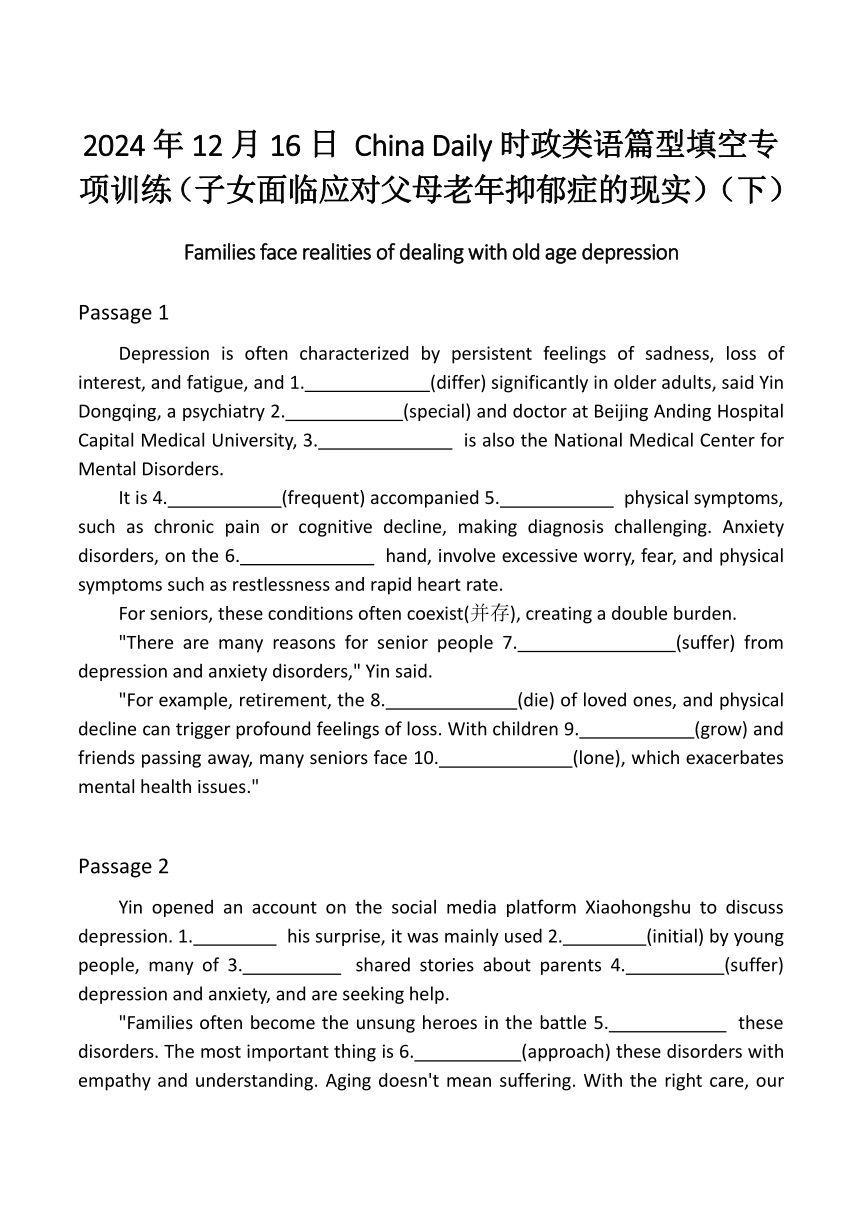
2024年12月16日 China Daily时政类语篇型填空专项训练(子女面临应对父母老年抑郁症的现实)(下) Families face realities of dealing with old age depression Passage 1 Depression is often characterized by persistent feelings of sadness, loss of interest, and fatigue, and 1. (differ) significantly in older adults, said Yin Dongqing, a psychiatry 2. (special) and doctor at Beijing Anding Hospital Capital Medical University, 3. is also the National Medical Center for Mental Disorders. It is 4. (frequent) accompanied 5. physical symptoms, such as chronic pain or cognitive decline, making diagnosis challenging. Anxiety disorders, on the 6. hand, involve excessive worry, fear, and physical symptoms such as restlessness and rapid heart rate. For seniors, these conditions often coexist(并存), creating a double burden. "There are many reasons for senior people 7. (suffer) from depression and anxiety disorders," Yin said. "For example, retirement, the 8. (die) of loved ones, and physical decline can trigger profound feelings of loss. With children 9. (grow) and friends passing away, many seniors face 10. (lone), which exacerbates mental health issues." Passage 2 Yin opened an account on the social media platform Xiaohongshu to discuss depression. 1. his surprise, it was mainly used 2. (initial) by young people, many of 3. shared stories about parents 4. (suffer) depression and anxiety, and are seeking help. "Families often become the unsung heroes in the battle 5. these disorders. The most important thing is 6. (approach) these disorders with empathy and understanding. Aging doesn't mean suffering. With the right care, our elders can find joy again," Yin said. Li Chun's mother, Wei Fengzhi, struggled 7. anxiety, which gradually worsened over time. Wei had always been a 8. (caution) woman, but after a minor car accident a few years ago the 70-year-old's anxiety escalated to debilitating levels. "At first, she just started worrying about the smallest things — 'Did I turn the stove 9. ' 'Are you sure the doors 10. (lock) ' But then, the worries grew bigger. She even became afraid of leaving the house. It was like her world became smaller and smaller," Li explained. Passage 3 In previous 1. (generate), mental illness was not openly discussed, and there was a significant cultural taboo(禁忌) 2. (surround) seeking help. The 3. (believe) that emotional struggles should 4. (keep) private or managed on one's own is still ingrained in many elderly people, especially those who were raised in times when mental health was often 5. (see) as a sign of 6. (weak) or moral failure. This can lead seniors 7. (ignore) their symptoms or downplay them to avoid 8. (label) as "weak" or "crazy".Many families dismiss signs of depression or anxiety in their elderly 9. (relate) because they assume it's a 10. (nature) response to the inevitable changes that come with aging. Passage 4 For example, a loss of interest in 1. (act), sleep disturbances, or withdrawal from social interactions migh ... ...
~~ 您好,已阅读到文档的结尾了 ~~